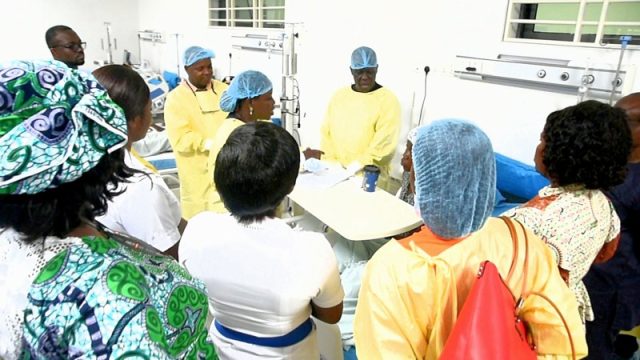By Jones Anlimah
Ghana is stepping up its fight against obstetric fistula with an ambitious national campaign aimed at eliminating the debilitating childbirth condition by 2030. The move coincides with global observance of the International Day to End Obstetric Fistula and includes free surgeries across several health facilities in the country.
This year, the focus shifted from symbolic events to action on the field. Medical teams are conducting concurrent surgical repairs at designated facilities across the country, providing relief to women affected by the condition.
“We decided to move away from the conference room to the hospitals and to the communities,” said Dr. Wilfred Ochan, Country Representative of the United Nations Population Fund (UNFPA) in Ghana. “We have selected four health facilities where concurrent surgeries are being carried out to repair survivors of obstetric fistula,” he added.
Obstetric fistula is a childbirth injury caused by prolonged or obstructed labor, leading to holes between the birth canal and the bladder or rectum. The condition causes uncontrollable leakage of urine or faeces, and survivors often face rejection, unemployment, and extreme social stigma.
“Although maternal health in Ghana has improved — with nearly 88% of births now taking place in health facilities — obstetric fistula remains a public health issue,” Dr. Ochan said. “For every mother who dies in childbirth, at least 20 suffer complications. One of the most devastating is fistula.”
According to a 2014 estimate from the Ghana College of Physicians and Surgeons, between 700 and 1,300 new cases of obstetric fistula occur annually in Ghana. Over the last decade, this may have resulted in over 13,000 untreated cases.
“If we’re serious about eliminating fistula by 2030, we must increase our annual repair capacity to more than 3,000 surgeries per year. That means equipping 10 key facilities to handle at least 300 repairs annually — about six surgeries per week per site should be our target,” Dr. Ochan stressed.
The campaign is coordinated under the Partnership to End Fistula in Ghana (PEFE), launched in December 2023. It has grown from 7 founding members to 18 institutional partners, including ministries, UN agencies, private banks, civil society groups, and media networks.

According to Dr. Ochan, Infrastructure is already expanding and that a fistula shelter is under construction in Yendi, and a new surgical theatre is being built in Tamale. Equipment has been donated, and fundraising continues through channels like Access Bank’s Chango Hub and Fidelity Bank’s donor programs. “Most victims have lost their livelihoods and cannot even afford to travel to hospitals,” Dr. Ochan noted. “This campaign is about restoring dignity and ensuring no woman is left behind simply for trying to bring life into the world.”
The World Health Organisation (WHO) is among the key partners supporting this initiative spearheaded by United Nations Population Fund (UNFPA) in Ghana. Dr. Catherine Attoh, Technical Officer for Reproductive, Maternal, Newborn, and Child Health at WHO Ghana, joined a field monitoring visit during the commemorative surgeries at the Volta regional capital, Ho.
“We are very happy to come around and see what is being done on the ground. We commend the facility’s leadership for mobilizing patients and providing this vital service. Our aim is to continue supporting this work and to bring more stakeholders on board,” she said.
In an interview with GBCNEWS, Dr. Attoh called for greater investment in healthcare systems. “The health of mothers is essential if we are considering health for all, which WHO stands for. Let us all come on board and support the partnership to end fistula in Ghana by 2030,” she noted.
She also addressed the stigma associated with the condition. “When a woman gets complications from doing something as natural and essential as giving birth, there is no need for society to stigmatize her,” Dr. Ato said. “We must help, not judge. Psychological trauma from stigma prevents many women from seeking care. We need to encourage them to come forward, because care is available — and currently, surgeries are being done free of charge in at least five partner-supported facilities,”she added.
A private sector breakfast is planned in the coming weeks to mobilize additional support. All funds raised are managed through a dedicated account under the Ghana Health Service.
According to the United Nations Population Fund (UNFPA) in Ghana, efforts to end fistula are not just a campaign and a medical mission but a movement and a moral imperative.















